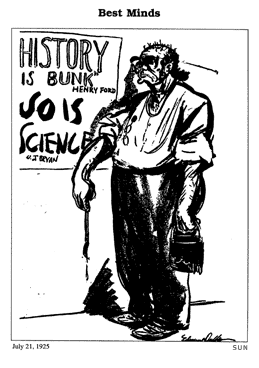| |
 |
|
|
|
| |
Last update on January 20, 2005 |
B3 The states motto 'stability, community, identity'by MargotSociety is shaped by a single, all-embracing political ideology – The Brave New World State´s motto: “Community, Identity, Stability” (--> ironical allusion to “liberté, égalité, fraternité” – slogan of the French Revolution) Community: - importance of the group and the subsequent unimportance of the individual individual = contributor to society “everyone belongs to everyone else” (p.35, ll 21f) “everyone works for everyone else.” (p.66, ll 7f) - no solitary amusement – always in groups
- community doesn´t exist of families (“For you must remember that in those days of gross viviparous reproduction, children were always brought up by their parents and not in State Conditioning Centres.” P.21, ll 3-5) - free sexual relations à no dissatisfaction or lovesickness - punishments in the best interest of Society (p.135, l 2)
Identity: - loss of identification with a family or home (“And do you know what a “home” was? They shook their heads.” P.31, ll 22-23) - “two thousand million inhabitants of the planet had only ten thousand names between them” (p.32 ll 6f) - various classes (castes) – specialized duties – distinguishing uniform - particular caste characteristics (Alpha, Beta …features, clothes) as a means of identification - lower classes = ninety-six identical twins performing a particular task - genetically-predestined (“Ninety-six identical twins working ninety-six identical machines! […] You really know where you are. For the first time in history.” P5,ll 9-12) - individuality is suppressed:
- knowledge of the past is banned by the Controllers to prevent invidious comparisons – “History is bunk” (p.30- l 10) - caste system in the name of social control - the inhabitants (laboratory-grown clones) are conditioned and indoctrinated, and even brainwashed in their sleep â conditioning manages satisfaction
Stability: (key word) Decanting, conditioning, abolition of the family, conformity in thought and action, consumption (“a love of nature keeps no factories busy. It was decided []to abolish the love of nature, but not the tendency to consume transport.” P19,ll 19-22) â contribution to a stable society
- “(there is) no civilization without social stability. No social stability without individual stability” (p.37, ll 14f) - “Bokanovsky´s Process is one of the major instruments of social stability” (p5, ll 3-4) - free will and individuality have been sacrificed in order to complete social stability - the inhabitants of BNW are never educated to prize thinking of themselves
- art, intellectual excitement and discovery have been abolished (everyone being smart, intelligent, and free would lead to instability) (“It isn´t only art that´s incompatible with happiness; it´s also science” “every discovery in pure science is potentially subversive” P.205; ll 25f, ll 12f) - stability requires both – the elimination of differences (exept with regard to caste) and the end of dissatisfaction “All men are physico-chemically equal” (p.65, l 29) - a life pharmalogical hedonism (the doctrine or theory of ethics in which pleasure is regarded as the chief good or the proper aim) - emotions are such a personal, intimate feeling of such overhelming individual influence – therefore the government in BNW discourages these intense human characteristics à dehumanization - with the destruction of the family, the government has single handedly prevented the largest source of human emotion: family love - soma – used to provide good feelings to keep people ‘happy’ and calm them (i.e. stable) - “Universal happiness keeps the wheels steadily turning; truth and beauty can´t.” (p.208, ll 15-17) - “Passion and neurasthenia mean instability. And instability means the end of civilization. You can´t have a lasting civilization without plenty of pleasant vices.” (p.216, ll 19-21)
History of BNW: - new calendar starts from Ford´s first Model T car. (p.46, l 20) - “The Nine Years´ War began in A.F. 141.” (after Ford) (p.42, l 15) - “There used to be something called God – before the Nine Years´ War.” (p.210, ll 4-6) - “The Nine Years´ War, the great Economic Collapse. There was a choice between World Control and destruction. Between stability and…” (p.43, ll 13-15) (à great influence of The Great Depression 1929 on Aldous Huxley→ he wished for an increase in stability) - “For a long period before the time of Our Ford, and even for some generations afterwards, erotic play between children had been regarded as abnormal” (p28, ll10-13) - family life had infringed stability (p.36, ll 26-34) - the famous British Museum Massacre: “Two thousand culture fans gassed with dichlorethyl sulphide.” “The Controllers realized that force was no good. The slower but infinitely surer methods of ectogenesis, neo-Pavlovian conditioning and hypnopaedia …” “… accompanied by a campaign against the Past; by the closing of museums, the blowing up of historical monuments (luckily most of them had already been destroyed during the Nine Years´ War); by the suppression of all books published before A.F. 150.” (p. 45; ll 4f, ll 10-13, ll 28-32) - the date, when the story takes place, is in the “year of stability, A.F. 632” (p2,.25)
Vocablist: subsequent (adj.): happening after sth else contribution (noun) (to sth)/(toward(s) sth/doing sth): a sum of money that is given to a person or an organization in order to help pay for sth; an action or a service that helps to cause or increase sth unorthodox (adj.): different from what is usual or accepted, heretical, nonconformist to indoctrinate: to force sb to accept a particular belief or set of beliefs and not allow them to consider any others conformity (noun) (to/with sth): behaviour or actions that follow the accepted rules of society menace (noun): a person or thing that will probably cause serious damage, harm or danger (à threat) an atmosphere that makes you feel threatened or frightened subversive (adj): trying or likely to destroy or damage a government or political system by attacking it secretly or indirectly neurasthenia (noun): an ill-defined medical condition characterized by lassitude, fatigue, headache, and irritability, associated chiefly with emotional disturbance vice (noun): evil or immoral behaviour; an evil or immoral quality in sb´s character ectogenesis (noun): Biol. Reproduction occurring outside the body to accompany: to travel or go somewhere with sb to happen or appear with sth else depression (noun): a period when there is little economic activity and many people are poor or without jobs deflation (noun): a reduction in the amount of money in a country´s economy so that prices fall or remain the same
|
|
 Aldous Huxley -
Brave New World
Aldous Huxley -
Brave New World


